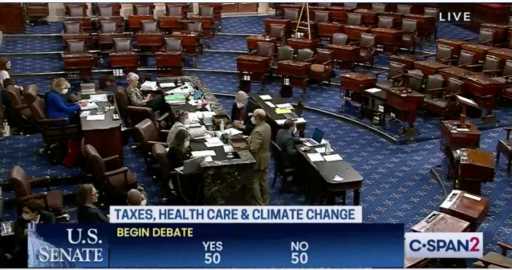Senate Votes To Proceed On Democrats’ Climate, Health And Tax Package
The Senate on Saturday voted to advance a $700 billion package to address climate change, curb the rising cost of prescription drugs and extend Affordable Care Act benefits.
The bill also will make a number of changes to the tax code, including the establishment of a 15% corporate minimum tax, intended to target major conglomerates that avoid paying taxes through a mixture of loopholes and other accounting maneuvers.
The legislation, the Inflation Reduction Act, now likely has the votes for final passage, a big victory for a centerpiece of President Joe Biden’s agenda, which looked to have stalled out earlier last month. The vote was 50-50 to bring the legislation to the floor, with Vice President Kamala Harris breaking the ties.
Before it clears the Senate, the legislation will have to go through a lengthy process of debates and what is referred to as vote-a-rama, in which Republicans and Democrats are expected to offer an array of amendments can be offered. That is expected to last until early in the morning on Sunday. Democrats have been working toward passage of the bill through the intricate legislative process of reconciliation, which allows bills to get to the floor by simple majority rather than the usual 60-vote threshold to avoid a filibuster.
Once the legislation passes, it will head to the House, where a vote is scheduled for next Friday.
“The Inflation Reduction Act is a groundbreaking bill for the American people: for families struggling to pay the bills, for seniors struggling to pay for medications, for kids struggling with asthma,” Senate Majority Leader Chuck Schumer (D-NY) said on the floor of the Senate before the vote to proceed. “This bill is for them.”
Schumer and Sen. Joe Manchin (D-WV) surprised Capitol Hill last week when they announced agreement on a proposal for $300 billion in deficit reduction and $370 billion in climate change and energy programs over the next decade. Manchin had been a holdout on Democrats’ more ambitious Build Back Better legislation, leading many Republicans to believe that any kind of major bill was dead.
The bill also would extend an expansion of the Affordable Care Act through 2025, and allow for Medicare to negotiate for prescription drugs.
The 15% minimum tax, meanwhile, would apply to companies that report $1 billion in profit, and impact those conglomerates who have been paying well below the 21% corporate rate. The legislation also anticipates increased IRS enforcement.
There have been some additional changes to the legislation to win the support of another Democratic centrist, Sen. Kyrsten Sinema (D-AZ), who demanded that the legislation remove a tax provision that would have limited the carried interest loophole. She also sought a preservation of bonus depreciation for companies.
Instead, a new provision was added to the legislation to add a 1% tax to stock buybacks.
The corporate minimum tax is aimed at companies that pay less than the 21% corporate rate using tax loopholes. When a 15% minimum was proposed tax last year, its chief backers Sen. Elizabeth Warren (D-MA), Sen. Ron Wyden (D-OR) and Sen. Angus King (I-ME) singled out Amazon, noting that it paid 4.3% in federal tax on the $45 billion in corporate profits over the past three years.
Content and media companies also have had varying effective tax rates, which factor in deductions and state and local taxes. Netflix’s effective rate was 12.39% in 2021, while Comcast’s was 27.54%, according to CSI Market data.
Must Read Stories
Brad Pitt’s ‘Bullet Train’ Gunning For $30M Domestic Bow For Sony Pictures
Anne Heche “Stable” After Fiery Car Crash Into House Near Santa Monica Airport
Alex Jones Slapped With $45.2 Million In Punitive Damages In Sandy Hook Case
The Letterboxd Story: Film Lovers & Film Listers Give Indie Distributors A Hand
Read More About:
Source: Read Full Article





